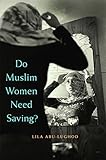Do Muslim Women Need Saving? /Lila Abu-Lughod.
Material type: TextPublication details: Cambridge, MA : Harvard University Press, (c)2013.Description: 1 online resource (324 pages)Content type:
TextPublication details: Cambridge, MA : Harvard University Press, (c)2013.Description: 1 online resource (324 pages)Content type: - text
- computer
- online resource
- 9780674726338
- HQ1170 .D668 2013
- COPYRIGHT NOT covered - Click this link to request copyright permission: https://lib.ciu.edu/copyright-request-form
| Item type | Current library | Collection | Call number | URL | Status | Date due | Barcode | |
|---|---|---|---|---|---|---|---|---|
 Online Book (LOGIN USING YOUR MY CIU LOGIN AND PASSWORD)
Online Book (LOGIN USING YOUR MY CIU LOGIN AND PASSWORD)
|
G. Allen Fleece Library ONLINE | Non-fiction | HQ1170 (Browse shelf(Opens below)) | Link to resource | Available | ocn862077007 |
Includes bibliographies and index.
COPYRIGHT NOT covered - Click this link to request copyright permission:
https://lib.ciu.edu/copyright-request-form
Do Muslim women (still) need saving? -- The new common sense -- Authorizing moral crusades -- Seductions of the "Honor Crime" -- The social life of Muslim women's rights -- An anthropologist in the territory of rights -- Conclusion: Registers of humanity.
Frequent reports of honor killings, disfigurement, and sensational abuse have given rise to a consensus in the West, a message propagated by human rights groups and the media: Muslim women need to be rescued. The author challenges this conclusion. An anthropologist who has been writing about Arab women for thirty years, she delves into the predicaments of Muslim women today, questioning whether generalizations about Islamic culture can explain the hardships these women face and asking what motivates particular individuals and institutions to promote their rights. In recent years the author has struggled to reconcile the popular image of women victimized by Islam with the complex women she has known through her research in various communities in the Muslim world. Here, she renders that divide vivid by presenting detailed vignettes of the lives of ordinary Muslim women, and showing that the problem of gender inequality cannot be laid at the feet of religion alone. Poverty and authoritarianism, conditions not unique to the Islamic world, and produced out of global interconnections that implicate the West, are often more decisive. The standard Western vocabulary of oppression, choice, and freedom is too blunt to describe these women's lives. This work is an indictment of a mindset that has justified all manner of foreign interference, including military invasion, in the name of rescuing women from Islam, as well as a portrait of women's actual experiences, and of the contingencies with which they live.
There are no comments on this title.
